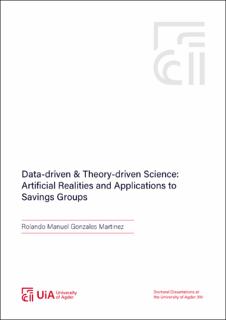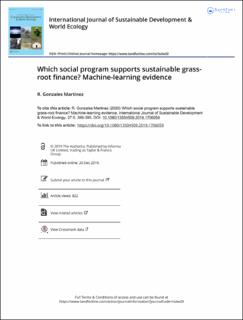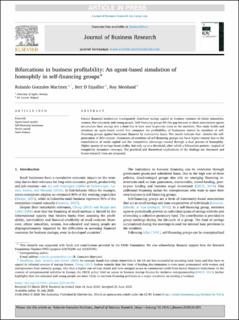| dc.contributor.author | Gonzales Martinez, Rolando Manuel | |
| dc.date.accessioned | 2021-02-11T10:22:46Z | |
| dc.date.available | 2021-02-11T10:22:46Z | |
| dc.date.created | 2021-01-30T15:19:35Z | |
| dc.date.issued | 2021 | |
| dc.identifier.citation | Gonzales Martinez, R. M. (2021). Data-driven & Theory-driven Science : Artificial Realities and Applications to Savings Groups (Doctoral thesis). University of Agder, Oslo. | en_US |
| dc.identifier.isbn | 978-82-8427-014-2 | |
| dc.identifier.issn | 1504-9272 | |
| dc.identifier.uri | https://hdl.handle.net/11250/2727383 | |
| dc.description | Paper I and Paper II is not published yet. They are excluded from the dissertation until they will be published. | en_US |
| dc.description.abstract | The scientific process is neither unique nor nomic. Two processes of scientific inquiry are theory-driven and data-driven science. This dissertation analyzes savings groups using theory-driven and data-driven methods. Simulated realities-based on data-driven theory-are used to understand the emerging dynamics of savings groups.
Savings groups are grassroots, community-based organizations composed of 15 to 30 members. These organizations-usually supported by international development agencies-have weekly meetings during a cycle of operations that typically lasts a year. In the groups, savings are kept in two funds: a fund for loans and a social welfare fund that covers life-cycle events.
The findings of Papers A to D in this dissertation provide new large-sample evidence about savings groups, their dynamics, and the factors affecting their financial performance. In practice, the results of Paper A to D shed light on the best policies to promote sustainable development with informal finance in a cost-effective way. A theory-driven approach indicates that the social fund in savings groups stimulates loan allocation among risk-sharing members, while implicitly covering idiosyncratic risks (Paper A). A data-driven approach based on Bayesian data-mining reveals that the macroeconomic environment and the facilitation model of development agencies have a strong influence on the profit-generating capacity of savings groups (Paper B). Machine-learning methods further show that business training is not the most frequent program implemented by development agencies, but it is in fact the most powerful intervention to encourage profits, particularly when a development agency stops working with a group and leaves a community (Paper C). Finally, the simulation of a village with artificial agents indicates that the businesses of savings groups can have higher profits due to the consolidation of social capital and the competitive advantage created through a process of homophily (Paper D).
Metatheoretically, the theory-driven and data-driven approaches of this dissertation-and the complementarity between these approaches-contribute to the epistemology of data-intensive science. The dissertation concludes that the gelstaltic and quasi-teleological explanations of the data-driven approach help to the formulation of theories through inductive and abductive reasoning. | en_US |
| dc.language.iso | eng | en_US |
| dc.publisher | 07 Media | en_US |
| dc.relation.ispartofseries | Doctoral Dissertations at the University of Agder; no. 310 | |
| dc.relation.haspart | Paper I: Gonzales Martinez, R. M., D’Espallier, B. & Mersland, R. (Forthcoming). Informal insurance and loan allocation in savings groups: The role of the welfare fund. Author´s original manuscript. Full-text is not available in AURA as a separate file. | en_US |
| dc.relation.haspart | Paper II: Gonzales Martinez, R. M., D’Espallier, B. & Mersland, R. (Forthcoming). What drives profit generation in savings groups? Bayesian data-mining discoveries. Author´s original manuscript. Full-text is not available in AURA as a separate file. | en_US |
| dc.relation.haspart | Paper III: Gonzales Martinez, R. M. (2019). Which social program supports sustainable grassroot finance? Machine-learning evidence. International Journal of Sustainable Development & World Ecology, 27(5), 389-395. https://doi.org/10.1080/13504509.2019.1706059. Author´s accepted manuscript. Full-text is available in AURA as a separate file: http://hdl.handle.net/11250/2635421. | en_US |
| dc.relation.haspart | Paper IV: Gonzales Martinez, R. M., D’Espallier, B. & Mersland, R. (2020). Bifurcations in business profitability: An agent-based simulation of homophily in self-financing groups. Journal of Business Research. https://doi.org/10.1016/j.jbusres.2020.06.051. Author´s accepted manuscript. Full-text is available in AURA as a separate file: . | en_US |
| dc.title | Data-driven & Theory-driven Science : Artificial Realities and Applications to Savings Groups | en_US |
| dc.type | Doctoral thesis | en_US |
| dc.description.version | publishedVersion | en_US |
| dc.rights.holder | © 2021 Rolando Manuel Gonzales Martínez | en_US |
| dc.subject.nsi | VDP::Samfunnsvitenskap: 200::Økonomi: 210 | en_US |
| dc.source.pagenumber | 134 | en_US |
| dc.source.issue | 310 | en_US |
| dc.identifier.cristin | 1883307 | |


